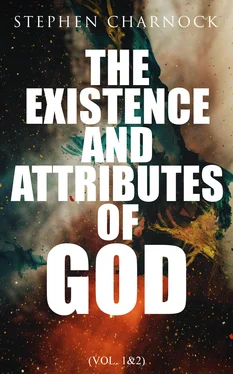Stephen Charnock - The Existence and Attributes of God (Vol. 1&2)
Здесь есть возможность читать онлайн «Stephen Charnock - The Existence and Attributes of God (Vol. 1&2)» — ознакомительный отрывок электронной книги совершенно бесплатно, а после прочтения отрывка купить полную версию. В некоторых случаях можно слушать аудио, скачать через торрент в формате fb2 и присутствует краткое содержание. Жанр: unrecognised, на английском языке. Описание произведения, (предисловие) а так же отзывы посетителей доступны на портале библиотеки ЛибКат.
- Название:The Existence and Attributes of God (Vol. 1&2)
- Автор:
- Жанр:
- Год:неизвестен
- ISBN:нет данных
- Рейтинг книги:3 / 5. Голосов: 1
-
Избранное:Добавить в избранное
- Отзывы:
-
Ваша оценка:
- 60
- 1
- 2
- 3
- 4
- 5
The Existence and Attributes of God (Vol. 1&2): краткое содержание, описание и аннотация
Предлагаем к чтению аннотацию, описание, краткое содержание или предисловие (зависит от того, что написал сам автор книги «The Existence and Attributes of God (Vol. 1&2)»). Если вы не нашли необходимую информацию о книге — напишите в комментариях, мы постараемся отыскать её.
The Existence and Attributes of God (Vol. 1&2) — читать онлайн ознакомительный отрывок
Ниже представлен текст книги, разбитый по страницам. Система сохранения места последней прочитанной страницы, позволяет с удобством читать онлайн бесплатно книгу «The Existence and Attributes of God (Vol. 1&2)», без необходимости каждый раз заново искать на чём Вы остановились. Поставьте закладку, и сможете в любой момент перейти на страницу, на которой закончили чтение.
Интервал:
Закладка:
2. The fears and anxieties in the consciences of men have given men sufficient occasion to root it out, had it been possible for them to do it. If the notion of the existence of God had been possible to have been dashed out of the minds of men, they would have done it rather than have suffered so many troubles in their souls upon the commission of sin; since there did not want wickedness and wit in so many corrupt ages to have attempted it and prospered in it, had it been possible. How comes it therefore to pass, that such a multitude of profligate persons that have been in the world since the fall of man, should not have rooted out this principle, and dispossessed the minds of men of that which gave birth to their tormenting fears? How is it possible that all should agree together in a thing which created fear, and an obligation against the interest of the flesh, if it had been free for men to discharge themselves of it? No man, as far as corrupt nature bears sway in him, is willing to live controlled.
The first man would rather be a god himself than under one: 28why should men continue this notion in them, which shackled them in their vile inclinations, if it had been in their power utterly to deface it? If it were an imposture, how comes it to pass, that all the wicked ages of the world could never discover that to be a cheat, which kept them in continual alarms? Men wanted not will to shake off such apprehensions; as Adam, so all his posterity are desirous to hide themselves from God upon the commission of sin, 29and by the same reason they would hide God from their souls. What is the reason they could never attain their will and their wish by all their endeavors? Could they possibly have satisfied themselves that there were no God, they had discarded their fears, the disturbers of the repose of their lives, and been unbridled in their pleasures. The wickedness of the world would never have preserved that which was a perpetual molestation to it, had it been possible to be razed out.
But since men under the turmoils and lashes of their own consciences could never bring their hearts to a settled dissent from this truth, it evidenceth, that as it took its birth at the beginning of the world, it cannot expire, no not in the ashes of it, nor in anything but the reduction of the soul to that nothing from whence it sprung. This conception is so perpetual, that the nature of the soul must be dissolved before it be rooted out, nor can it be extinct while the soul endures.
3. Let it be considered also by us that own the Scripture, that the devil deems it impossible to root out this sentiment. It seems to be so perpetually fixed, that the devil did not think fit to tempt man to the denial of the existence of a Deity, but persuaded him to believe he might ascend to that dignity and become a god himself; Gen. iii. 1, “Hath God said?” and he there owns him (ver. 5), “Ye shall become as gods.” He owns God in the question he asks the woman, and persuades our first parents to be gods themselves. And in all stories, both ancient and modern, the devil was never able to tincture men’s minds with a professed denial of the Deity, which would have opened a door to a world of more wickedness than hath been acted, and took away the bar to the breaking out of that evil, which is naturally in the hearts of men, to the greater prejudice of human societies. He wanted not malice to raze out all the notions of God, but power: he knew it was impossible to effect it, and therefore in vain to attempt it. He set up himself in several places of the ignorant world as a god, but never was able to overthrow the opinion of the being of a God. The impressions of a Deity were so strong as not to be struck out by the malice and power of hell.
What a folly is it then in any to contradict or doubt of this truth, which all the periods of time have not been able to wear out; which all the wars and quarrels of men with their own consciences have not been able to destroy; which ignorance and debauchery, its two greatest enemies, cannot weaken; which all the falsehoods and errors which have reigned in one or other part of the world, have not been able to banish; which lives in the consents of men in spite of all their wishes to the contrary, and hath grown stronger, and shone clearer, by the improvements of natural reason!
Thirdly, Natural and innate; which pleads strongly for the perpetuity of it. It is natural, though some think it not a principle writ in the heart of man; 30it is so natural that every man is born with a restless instinct to be of some kind of religion or other, which implies some object of religion. The impression of a Deity is as common as reason, and of the same age with reason. 31It is a relic of knowledge after the fall of Adam, like fire under ashes, which sparkles as soon as ever the heap of ashes is opened. A notion sealed up in the soul of every man; 32else how could those people who were unknown to one another, separate by seas and mounts, differing in various customs and manner of living, had no mutual intelligence one with another, light upon this as a common sentiment, if they had not been guided by one uniform reason in all their minds, by one nature common to them all: though their climates be different, their tempers and constitutions various, their imaginations in some things as distant from one another as heaven is from earth, the ceremonies of their religion not all of the same kind; yet wherever you find human nature, you find this settled persuasion. So that the notion of a God seems to be twisted with the nature of man, and is the first natural branch of common reason, or upon either the first inspection of a man into himself and his own state and constitution, or upon the first sight of any external visible object. Nature within man, and nature without man, agree upon the first meeting together to form this sentiment, that there is a God. It is as natural as anything we call a common principle. One thing which is called a common principle and natural is, that the whole is greater than the parts. If this be not born with us, yet the exercise of reason essential to man settles it as a certain maxim; upon the dividing anything into several parts, he finds every part less than when they were altogether. By the same exercise of reason, we cannot cast our eyes upon anything in the world, or exercise our understandings upon ourselves, but we must presently imagine, there was some cause of those things, some cause of myself and my own being; so that this truth is as natural to man as anything he can call most natural or a common principle.
It must be confessed by all, that there is a law of nature writ upon the hearts of men, which will direct them to commendable actions, if they will attend to the writing in their own consciences. This law cannot be considered without the notice of a Lawgiver. For it is but a natural and obvious conclusion, that some superior hand engrafted those principles in man, since he finds something in him twitching him upon the pursuit of uncomely actions, though his heart be mightily inclined to them; man knows he never planted this principle of reluctancy in his own soul; he can never be the cause of that which he cannot be friends with. If he were the cause of it, why doth he not rid himself of it? No man would endure a thing that doth frequently molest and disquiet him, if he could cashier it. It is therefore sown in man by some hand more powerful than man, which riseth so high, and is rooted so strong, that all the force that man can use cannot pull it up. If therefore this principle be natural in man, and the law of nature be natural, the notion of a Lawgiver must be as natural, as the notion of a printer, or that there is a printer, is obvious upon the sight of a stamp impressed. After this the multitude of effects in the world step in to strengthen this beam of natural light, and the direct conclusion from thence is, that that power which made those outward objects, implanted this inward principle. This is sown in us, born with us, and sprouts up with our growth, or as one saith; it is like letters carved upon the bark of a young plant, which grows up together with us, and the longer it grows the letters are more legible. 33
Читать дальшеИнтервал:
Закладка:
Похожие книги на «The Existence and Attributes of God (Vol. 1&2)»
Представляем Вашему вниманию похожие книги на «The Existence and Attributes of God (Vol. 1&2)» списком для выбора. Мы отобрали схожую по названию и смыслу литературу в надежде предоставить читателям больше вариантов отыскать новые, интересные, ещё непрочитанные произведения.
Обсуждение, отзывы о книге «The Existence and Attributes of God (Vol. 1&2)» и просто собственные мнения читателей. Оставьте ваши комментарии, напишите, что Вы думаете о произведении, его смысле или главных героях. Укажите что конкретно понравилось, а что нет, и почему Вы так считаете.












